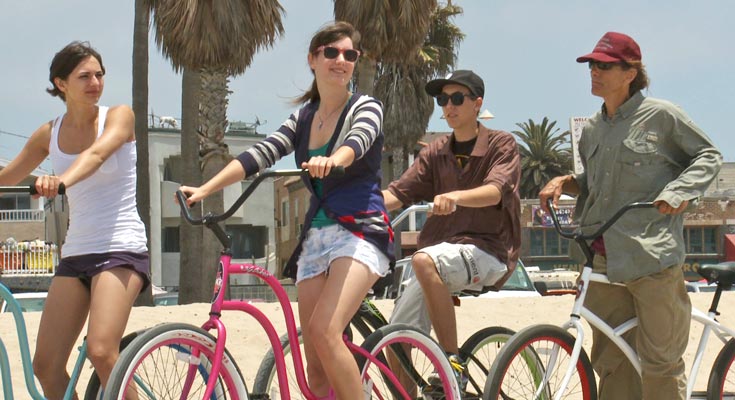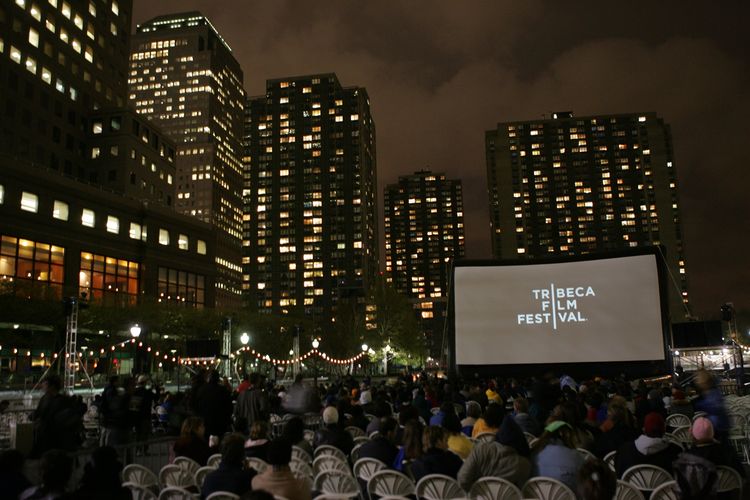By Delia Paunescu
Like many events in New York, the Tribeca Film Festival is the biggest deal for those participating. For everyone else, it’s another week or two of red carpets, guest lists and in-cab commercials. So it went for me the last few years – avoiding the crowds and escalated ticket prices – until I scored an all-day pass for the last day of the festival. As my first time there, and my first time at any film festival, I jumped into the madness feet first and saw five films in nine hours.
Overall, the features I saw highlighted the general loveliness of the human condition. Themes of generosity and congeniality came to the forefront as characters both real and imagined faced failure and success with a charm that made audiences “aww” in unison.

Bombay Beach
The first feature from music video director Alma Har’el, this unusual documentary tells the story of a deserted area in Imperial County, California, miles away from any proper civilization. Its closest neighbor is a make-shift trailer park known as “Slab City,” where the residents of Bombay Beach live in a squalorous limbo. The characters seem to be waiting for salvation or damnation: the octogenarian who resells reservation cigarettes to support his scotch habit, the 16-year-old football star who left east L.A. to avoid the gang violence, and a bipolar, overmedicated 7-year-old, whose parents served time in federal prison after the FBI found militia level firearms on their property. Woven with choreographed dance sequences set to the music of Beirut (with whom Har’el worked on several videos) and Bob Dylan, we are taken through the unusual circumstances of life in these two ruinous locales in a stunning and bizarre way. Bombay Beach was named World Documentary Competition Award Winner.

Paraisos Artificiales (Artificial Paradises)
Tribeca’s winner of the Best Cinematography – Narrative Award, this Mexican admission follows Luisa (Luisa Pardo), a young woman who comes to a deserted beach on the Gulf Coast in search of solitude and sobriety. Chain smoking by day and burning the last of her heroin by night, Luisa befriends recovering smoker and long-time pot enthusiast Salomon (Salomon Hernandez). The film is indeed beautifully shot and I have to agree with the Tribeca volunteer who introduced Yulene Olaizola’s film by saying, “Just let it wash over you.” Similar to Sofia Coppola’s Somewhere, I found myself too agitated to enjoy the frustratingly slow pace. After watching Luisa walk down a set of mountain stairs toward the beach for 15 minutes – a trek I later told my plus one I could have made more quickly in real time – I actually dozed off. When I awoke from my cat nap, our protagonist had made it to the surf and was enjoying a cigarette with equal lethargy. Ultimately, Artificial Paradises is a lesson in life lived on the outskirts – breathing it in, letting it happen and accepting whatever comes our way with enough calm that even flicking ashes from a cigarette seems accelerated and unnecessary.

Donor Unknown
Another festival winner, this time for Tribeca Online Best Feature, the documentary Donor Unknown explores the business of children who are conceived via sperm donation. The film begins at the California Cryobank, where the titular donor makes his contribution. Children are then introduced, one by one, alongside footage of bio-dad Jeffrey Harrison. Thanks to an online database, the half-siblings find each other and a New York Times article about their reunion catches the attention of Donor 150. Eventually meeting each other and finally their father, an aging hippie living in his RV on Venice Beach with three dogs and a rescued pigeon, the makeshift family shows us how much work the children have put in for the chance to have an active connection with genetic family. I walked out determined to call home. A minimal focus on the lesbian couples who used Jeffrey’s sperm to start a family also caught my attention. Don’t be surprised if a follow-up feature is on its way, emphasizing the business of babies for same-sex families.

Turn Me On, Godammit
The topic of teenage hormones is not new territory. Neither is a young girl’s plight with authority and boredom. This Norwegian film from Jannicke Systad Jacobsen, and winner of Best Screenplay – Narrative Award, makes this cliché refreshing and light. Here, sex is not looked at as something dirty, wrong or secretive. The audience is thrown into the 15-year-old’s sexual desires from the opening scene, as Alma is seen masturbating on the kitchen floor with the help of a sex line operator. Actress Helene Bergsholm is an enviable combination of gorgeous and absolutely hilarious. Her long frame, bee-stung lips and hair the shade of light blonde which only looks natural in Scandinavian descendants enhance her lines, delivered with absolute deadpan. As the story progresses, Alma continues to be open about her sexual yearnings both at home and with her friends. But while she is treated as an outcast after her crush is candidly exposed, we are too busy laughing to fully feel Alma’s troubles. That the film is egalitarian in its showing of sexual organs should please Jezebel writers and readers alike. Ultimately, the film’s tone lies somewhere in the 500 Days of Summer realm, between American Pie and Virgin Suicides as Alma’s fantasies, both romantic and sexual, are shown alongside the reality of small-town life. I can only hope more films would be this liberated about sexuality, teenage or otherwise.

Carol Channing: Larger Than Life
It seems every year the festival circuit includes a de rigueur doc about a powerhouse female. Last year’s Joan Rivers: A Piece of Work taught us what a workhorse the style maven really is. This year’s portrayal into the life of Broadway beauty Carol Channing is no different. Ten minutes into Dori Berinstein’s new work, I thought I would burst of squealing. At 90, Channing has more energy than most twenty-somethings I know on a full night’s sleep and a double espresso. The San Francisco native has never stopped performing, and we soon learn she only missed one performance in her 70-plus-year career. Theater-lovers won’t stop smiling throughout, and there’s a reason Larger Than Life won third place in the Heineken Audience Award this year: the effervescence with which Channing charmed the world over is palpable even for those wary of the stage life. Seeing her interactions with childhood sweetheart and fourth husband Harry Kullijian is just icing on this scrumptious cake of bubbly delight.




1 comment
Inspiring New Filmmakers at Tribeca: A chat with Jenée LaMarque. says:
Mar 28, 2016
[…] Banner Image Courtesy: http://www.t-sides.com/2011/05/12/tales-from-tribeca/ […]